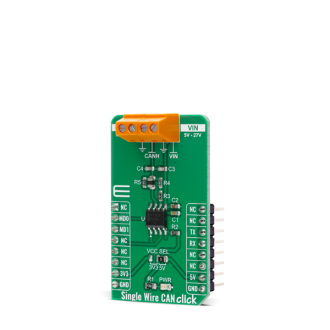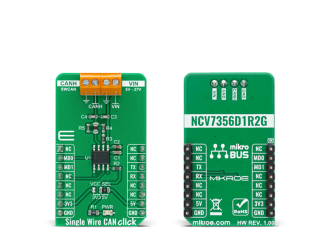
We strongly encourage users to use Package manager for sharing their code on Libstock website, because it boosts your efficiency and leaves the end user with no room for error. [more info]

Rating:
Author: MIKROE
Last Updated: 2020-09-02
Package Version: 1.0.0.0
mikroSDK Library: 1.0.0.0
Category: CAN
Downloaded: 3215 times
Not followed.
License: MIT license
Single Wire CAN Click is a compact add-on board that contains an IC for a single wire data link capable of operating with various protocols such as the Controller Area Network (CAN).
Do you want to subscribe in order to receive notifications regarding "Single Wire CAN click" changes.
Do you want to unsubscribe in order to stop receiving notifications regarding "Single Wire CAN click" changes.
Do you want to report abuse regarding "Single Wire CAN click".


Library Description
The library covers all the necessary functions to control Single Wire CAN click board. Library performs a standard UART interface communication.
Key functions:
void singlewirecan_set_operating_mode ( uint8_t op_mode ) - Set operating mode function.void singlewirecan_write_data ( uint8_t *tx_data ) - Write multi bytes function.Examples description
The application is composed of three sections :
void application_task ( )
{
mikrobus_logWrite( "----------------------", _LOG_LINE );
mikrobus_logWrite( "", _LOG_LINE );
singlewirecan_write_data( &demo_message_data[ 0 ] );
mikrobus_logWrite( " TX Data: ", _LOG_TEXT );
mikrobus_logWrite( demo_message_data, _LOG_LINE );
Delay_ms( 3000 );
}
Other mikroE Libraries used in the example:
Additional notes and informations
Depending on the development board you are using, you may need USB UART click, USB UART 2 click or RS232 click to connect to your PC, for development systems with no UART to USB interface available on the board. The terminal available in all MikroElektronika compilers, or any other terminal application of your choice, can be used to read the message.